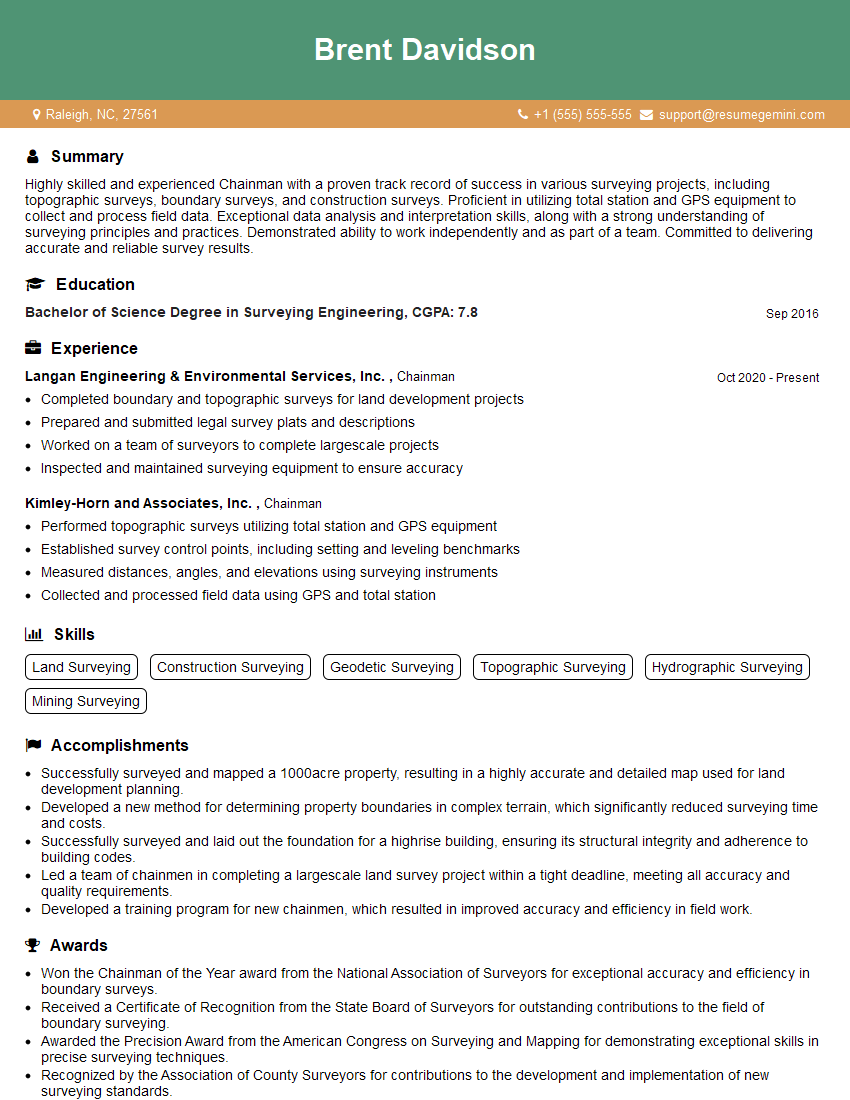Are you gearing up for a career shift or aiming to ace your next interview? Look no further! We’ve curated a comprehensive guide to help you crack the interview for the coveted Chainman position. From understanding the key responsibilities to mastering the most commonly asked questions, this blog has you covered. So, buckle up and let’s embark on this journey together.
Acing the interview is crucial, but landing one requires a compelling resume that gets you noticed. Crafting a professional document that highlights your skills and experience is the first step toward interview success. ResumeGemini can help you build a standout resume that gets you called in for that dream job.
Essential Interview Questions For Chainman
1. What are the primary responsibilities of a Chainman?
- Measure and mark distances along survey lines.
- Set up and hold measuring equipment, such as chains, tapes, and rods.
- Record measurements accurately in field notes.
- Assist in other surveying tasks, such as setting up instruments and clearing brush.
2. What are the different types of chains used in surveying?
Chain
- Gunters Chain
- Engineers Chain
- Revenue Chain
Tape
- Metallic Tape
- Invar Tape
- Steel Tape
- Cloth Tape
3. How do you ensure accuracy when measuring distances with a chain?
- Calibrate the chain regularly.
- Measure along a straight line.
- Apply appropriate tension to the chain.
- Record measurements to the nearest link.
- Double-check measurements by repeating them.
4. What are the different methods used to measure vertical distances in surveying?
- Leveling
- Trigonometric leveling
- Barometric leveling
5. What precautions should you take when using a tape to measure distances on a slope?
- Hold the tape horizontal to the slope.
- Use a plumb bob or laser level to ensure the tape is vertical.
- Apply the appropriate slope correction to the measurement.
- Take multiple measurements and average them to reduce errors.
6. How do you calculate the area of a plot of land using chain surveying?
Area = (1/2) * (d1 + d2 + d3 + …) * (a1 + a2 + a3 + …)
- d1, d2, d3, … are the distances measured along the boundaries.
- a1, a2, a3, … are the angles between the boundaries.
7. What are the different types of errors that can occur in chain surveying?
- Instrumental errors
- Natural errors
- Human errors
8. How do you minimize errors in chain surveying?
- Use calibrated equipment.
- Take multiple measurements and average them.
- Work in favorable weather conditions.
- Be aware of potential sources of error.
- Follow established surveying procedures.
9. What are the different types of field notes used in chain surveying?
- Level book
- Chainage book
- Field sketch
10. What are the different types of surveying instruments used in chain surveying?
- Chain
- Tape
- Level
- Theodolite
- EDM
Interviewers often ask about specific skills and experiences. With ResumeGemini‘s customizable templates, you can tailor your resume to showcase the skills most relevant to the position, making a powerful first impression. Also check out Resume Template specially tailored for Chainman.
Career Expert Tips:
- Ace those interviews! Prepare effectively by reviewing the Top 50 Most Common Interview Questions on ResumeGemini.
- Navigate your job search with confidence! Explore a wide range of Career Tips on ResumeGemini. Learn about common challenges and recommendations to overcome them.
- Craft the perfect resume! Master the Art of Resume Writing with ResumeGemini’s guide. Showcase your unique qualifications and achievements effectively.
- Great Savings With New Year Deals and Discounts! In 2025, boost your job search and build your dream resume with ResumeGemini’s ATS optimized templates.
Researching the company and tailoring your answers is essential. Once you have a clear understanding of the Chainman‘s requirements, you can use ResumeGemini to adjust your resume to perfectly match the job description.
Key Job Responsibilities
Chainmen perform crucial tasks in land surveying, assisting surveyors in measuring distances, angles, and elevations.
1. Surveying Assistance
Collaborate with surveyors to establish boundary lines, determine property dimensions, and prepare topographic maps.
2. Measurement and Data Collection
Use surveying equipment, such as chains, tapes, and transits, to measuredistances, angles, and elevations.
3. Fieldwork and Note-Taking
Conduct fieldwork, record measurements, and maintain accurate field notes.
4. Equipment Handling and Maintenance
Ensure proper use and maintenance of surveying equipment.
5. Physical Endurance and Teamwork
Exhibit physical endurance to work outdoors in various conditions and work effectively as part of a surveying team.
Interview Tips
Preparing for a Chainman interview requires thorough research and practice.
1. Research the Company and Position
Understand the company’s profile, services, and the specific requirements of the Chainman role.
2. Practice Common Interview Questions
Review frequently asked interview questions related to land surveying, measurement techniques, and teamwork.
- Tell me about your experience in land surveying.
- Describe your knowledge of surveying equipment.
- How do you ensure accuracy in your measurements?
- Can you provide an example of a challenging surveying project you worked on?
3. Highlight Relevant Skills and Experience
Emphasize your proficiency in measurement techniques, attention to detail, and teamwork abilities.
4. Prepare for Fieldwork Scenarios
Anticipate questions about your experience in fieldwork, data collection, and equipment handling.
5. Dress Professionally and Be Punctual
Demonstrate professionalism by dressing appropriately and arriving on time for the interview.
Next Step:
Armed with this knowledge, you’re now well-equipped to tackle the Chainman interview with confidence. Remember, a well-crafted resume is your first impression. Take the time to tailor your resume to highlight your relevant skills and experiences. And don’t forget to practice your answers to common interview questions. With a little preparation, you’ll be on your way to landing your dream job. So what are you waiting for? Start building your resume and start applying! Build an amazing resume with ResumeGemini.
